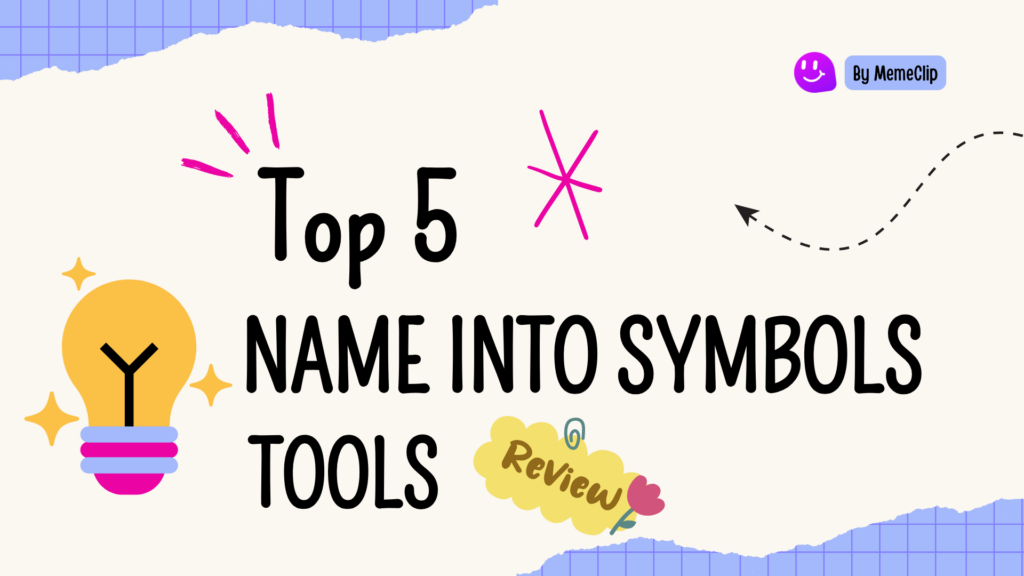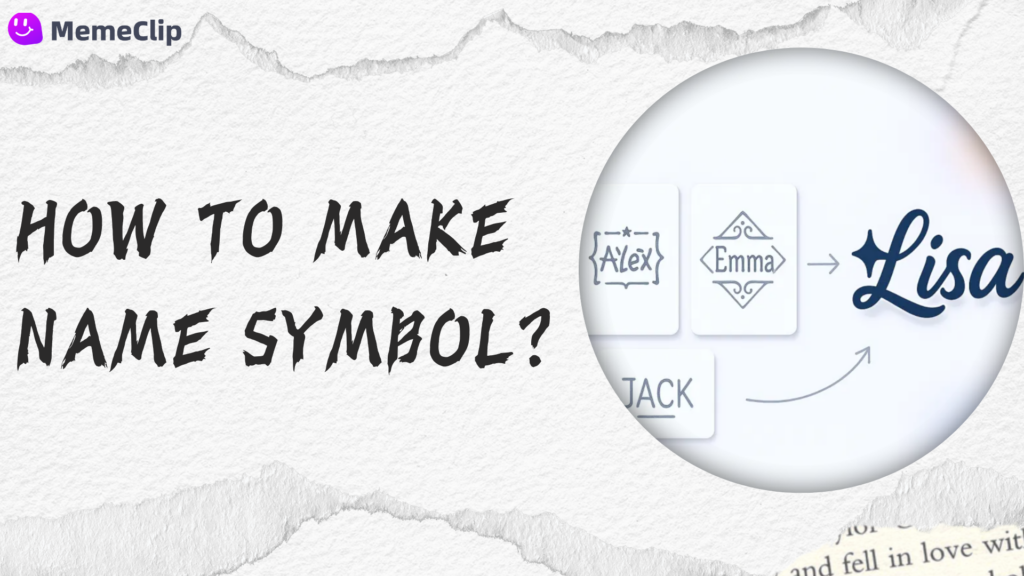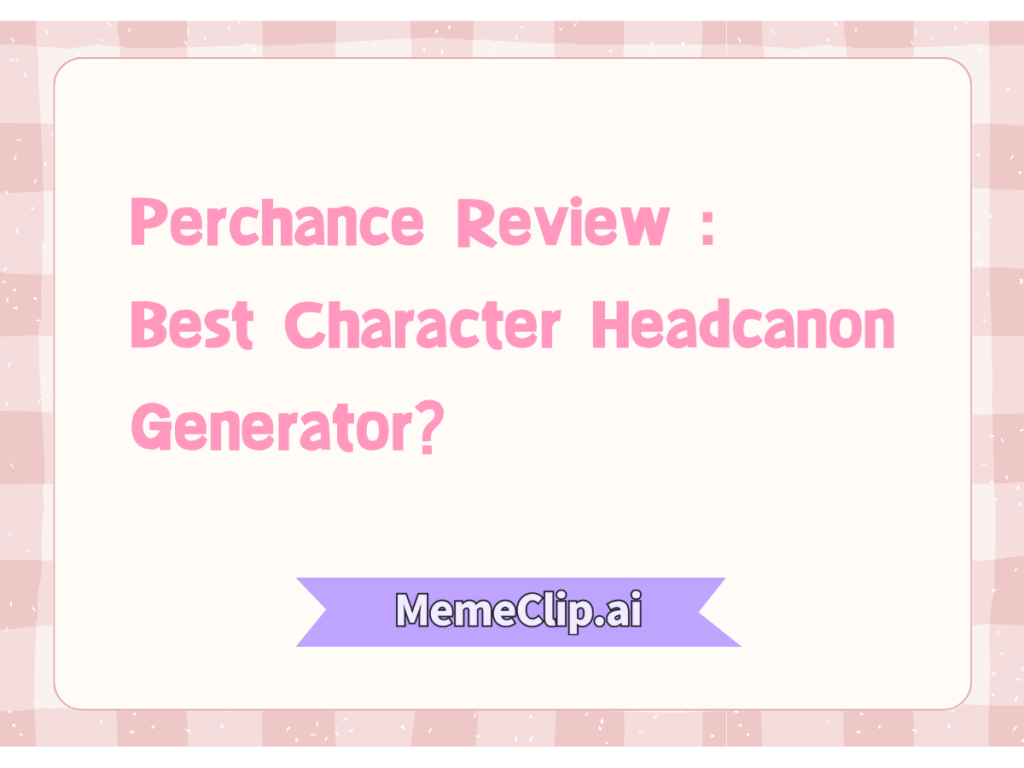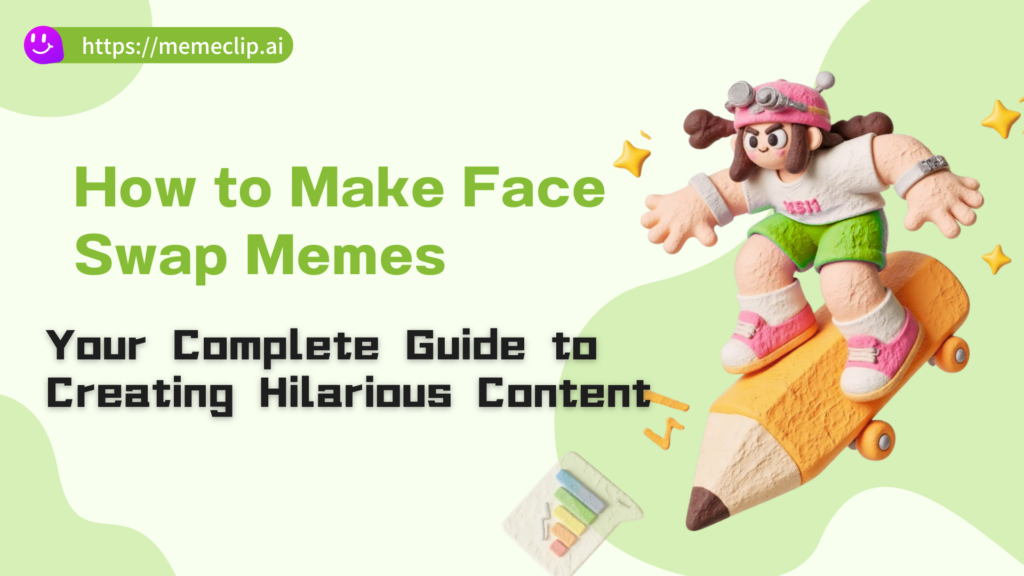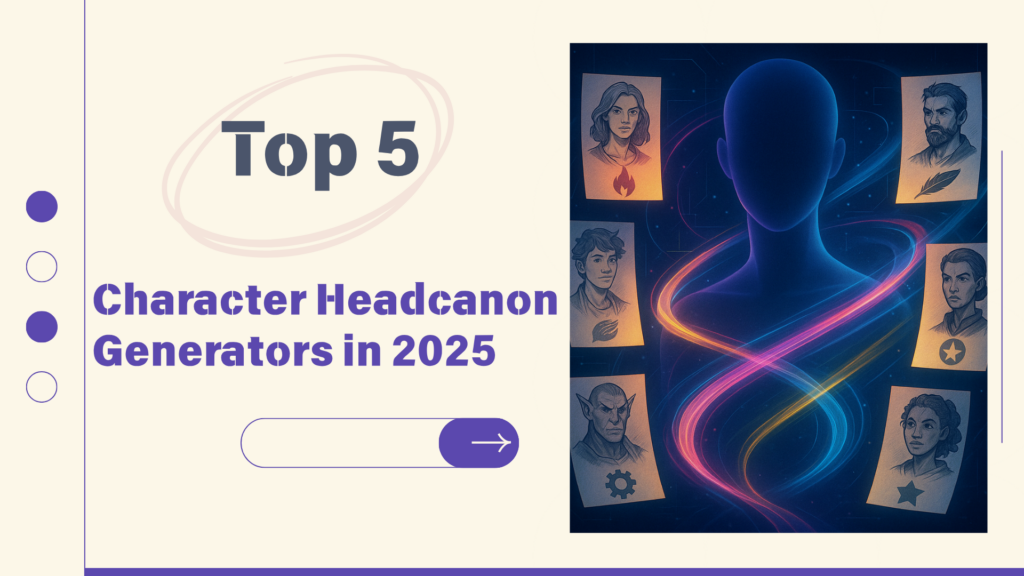Great Characters Aren’t Born, They’re Built
List your favorite novels—the ones that left a mark. Chances are, they all share one thing: an unforgettable character.
Whether it's a wizard boy marked by destiny, a detective with too many vices, or a reluctant hero just trying to survive—the best stories start with someone you can believe in. Someone messy, flawed, complicated. Someone human.
But here’s the challenge: how do you create a personality for a character that feels this real?
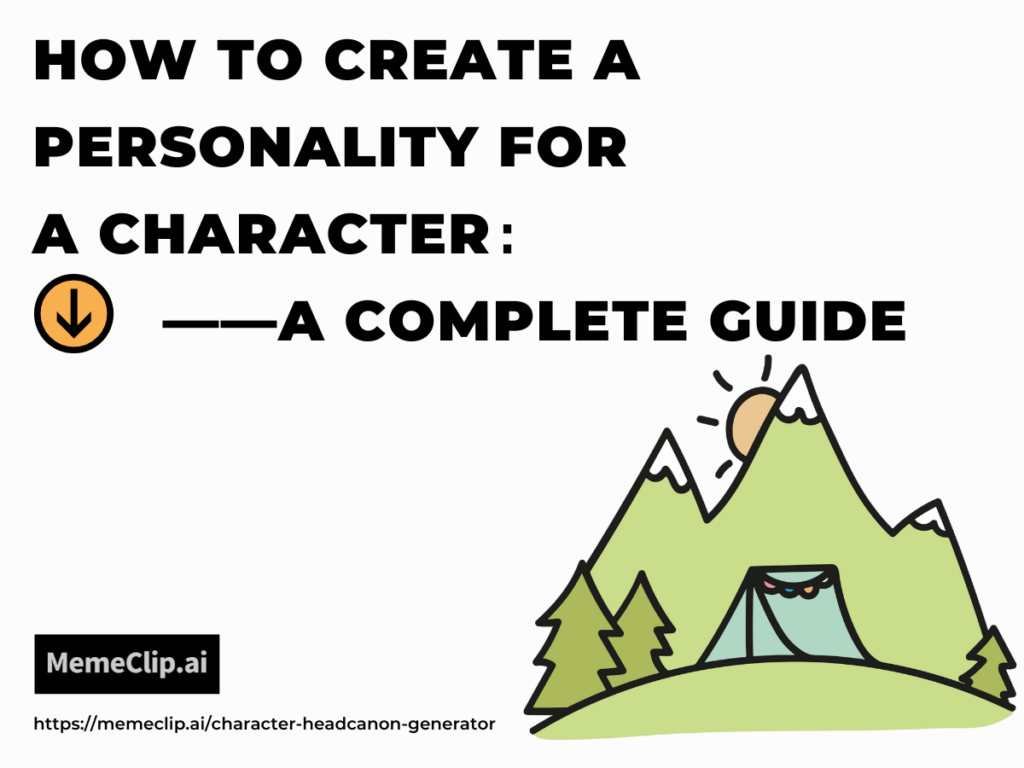
Tools like MemeClip’s character headcanon generator can help spark ideas, especially when you’re starting from a blank page.
For some writers, like Stephen King, the character emerges in the middle of chaos: “I put interesting characters in difficult situations and write to find out what happens.” For others, especially beginner writers or outliners, it helps to build the foundation first—to define who the character is before the story begins.
Regardless of your approach, the truth remains the same: if your characters don’t feel real, your audience won’t care what happens to them.
That’s why mastering how to create a personality for a character isn’t just a nice-to-have skill—it’s the backbone of storytelling, worldbuilding, and emotional engagement.
Who Needs Character Personality? It's More Than Just Fiction Writers
The importance of personality in character design goes far beyond novelists. In today's creative world, entire communities and industries revolve around building memorable characters—and they all need strong personalities to connect with their audiences.
Below are some of the most common groups and creative circles where character personality is essential:
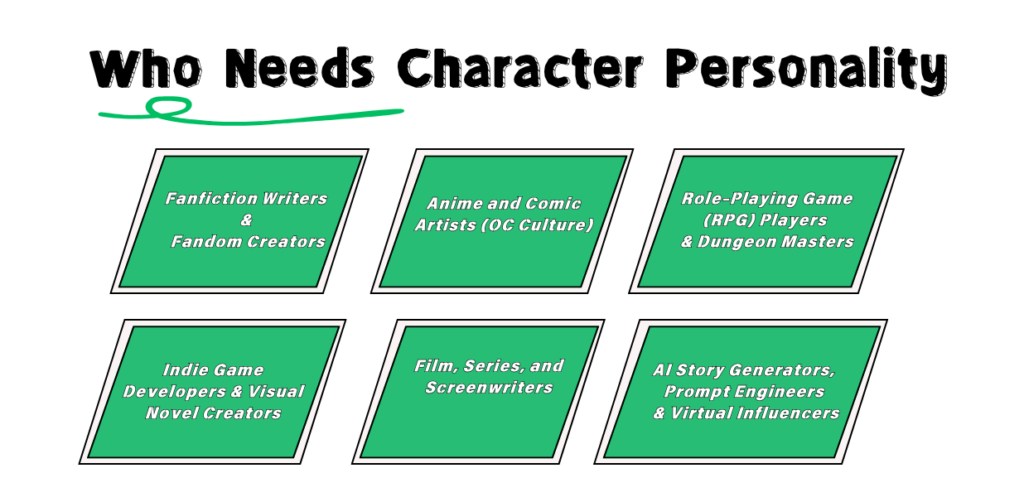
1. Fanfiction Writers & Fandom Creators
Fandom culture thrives on reinterpretation. Writers and artists don’t just replicate existing characters—they explore them. They ask: “What would this character do in a modern setting? What if they fell in love with someone unexpected? What if they had a traumatic past we never saw on screen?”
In these spaces, knowing how to create a personality for a character helps fan creators stay true to the essence of the original while adding fresh, compelling layers. Entire fandoms on platforms like AO3, Wattpad, and Tumblr are built on this nuanced understanding.
2. Anime and Comic Artists (OC Culture)
Original Characters (OCs) are the lifeblood of anime-style and comic communities. From Instagram sketch accounts to DeviantArt pages and TikTok edits, creators often showcase their OCs not just through art, but through detailed character sheets, headcanons, or personality quizzes.
A visually stunning character with no personality is quickly forgotten. But one with quirks, flaws, and emotional depth? That’s what makes followers care—and share.
3. Role-Playing Game (RPG) Players & Dungeon Masters
In Dungeons & Dragons or similar RPG systems, players aren’t just rolling dice—they’re stepping into fully fleshed characters with their own beliefs, fears, and flaws.
A good character sheet might include stats. A great one includes why they hate authority, or why they collect books they never read.
Dungeon Masters, too, need to craft believable NPCs who don’t just move the story forward but feel like part of a breathing world. Knowing how to create a personality for a character is what keeps a campaign emotionally resonant over many sessions.

4. Indie Game Developers & Visual Novel Creators
In visual novels, choice-based games, or story-driven indies, characters often carry the emotional weight of the experience. Whether it's a romance sim, psychological thriller, or slice-of-life title, players won’t remember the number of endings—they’ll remember who made them laugh, cry, or question their morals.
Developers in these genres often create character personality matrices, moodboards, and dialogue trees that depend entirely on consistent, well-thought-out personalities.
5. Film, Series, and Screenwriters
From blockbusters to short films, every scene hinges on believable human behavior. Audiences can spot a flat character from the first minute—and once that trust breaks, it’s hard to recover.
Learning how to create a personality for a character helps screenwriters develop arcs that feel earned, plot twists that make emotional sense, and character dynamics that audiences remember long after the credits roll.
6. AI Story Generators, Prompt Engineers & Virtual Influencers
Yes, even in the world of AI and synthetic media, character personality matters.
If you’re building an AI persona for storytelling, a chatbot, or a virtual influencer, that digital character needs to “think” in a coherent way. What do they like? What makes them jealous? What triggers their sarcasm?
The better you understand how to create a personality for a character, the more immersive and convincing your AI-generated experiences will be.
Step-by-Step Guide: How to Create a Personality for a Character
Creating a personality for a character doesn’t have to be overwhelming. Whether you’re a writer, role-player, artist, or game developer, the following steps will help you construct a personality that feels layered, consistent, and alive.
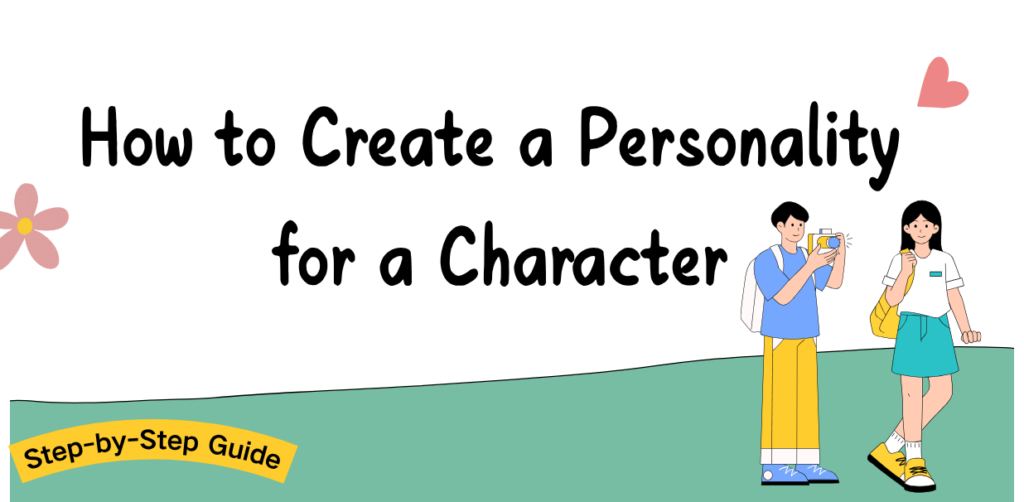
1. Define the Character's Core Traits
Start simple: what are the three defining traits of your character?
Are they loyal, but impulsive? Confident, but a little manipulative?
Choose a mix of positive and negative qualities. Balanced personalities are far more believable than perfect ones. A character who’s brave but reckless offers far more room for growth than someone who’s simply “heroic.”
You can draw inspiration from established systems like:
- The Big Five Personality Traits (Openness, Conscientiousness, Extraversion, Agreeableness, Neuroticism)
- MBTI (e.g., INFP dreamer or ENTJ leader types)
- Enneagram types, especially for internal motivation
These models aren’t rules—but they give structure when you’re figuring out how to create a personality for a character that feels intentional.
2. Create a Backstory That Explains Their Behavior
Personality doesn’t just exist—it’s formed. Childhood trauma, societal pressure, failures, victories—these all shape who a person becomes.
Ask:
- What event changed them forever?
- Who do they fear disappointing the most?
- What do they hide from others—and why?
You don’t have to write an entire biography. But even just a few key moments from their past can justify how they behave now. This is the difference between a character saying they’re angry… and us feeling it.
When wondering how to create a personality for a character, always return to the question: What made them this way?
3. Add Contradictions to Avoid Flat Characters
Real people are full of contradictions—and your characters should be, too.
- A kind person who’s harsh under pressure
- A strong leader who avoids emotional intimacy
- A rule-follower who secretly dreams of rebellion
These paradoxes make characters feel real. They also fuel plot twists and emotional beats that resonate with readers or players.
Don’t be afraid to layer your character’s actions with mixed signals. That’s how life works—and it’s how storytelling becomes powerful.
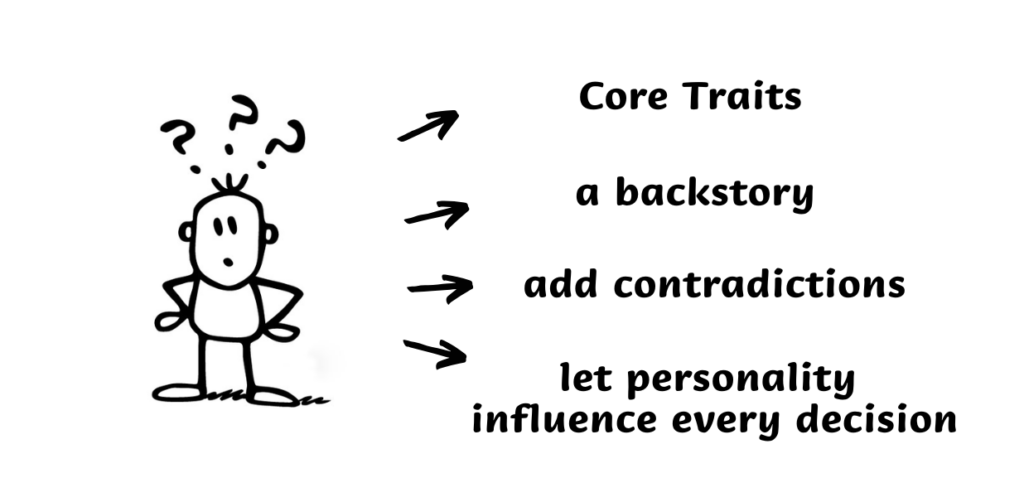
4. Let Personality Influence Every Decision
Now it’s time to test your character.
How do they respond to:
- Public praise?
- Betrayal by a close friend?
- A no-win situation?
Use small scenarios to explore how their personality drives behavior. Do they freeze up under stress or take control? Do they lie to protect someone or come clean?
Every decision your character makes should feel like it belongs to them—not just the writer.
5. Use Creative Tools to Expand and Refine
Sometimes, even experienced creators hit a wall. That’s where tools come in handy—not to replace your creativity, but to reignite it.
One especially helpful option is the character headcanon generator by MemeClip.
It’s designed for fan creators, roleplayers, and storytellers who want to quickly explore unexpected personality insights. With a few clicks, you can generate unique “headcanon” personality details like:
- Hidden fears your character doesn’t admit
- Weird habits they picked up as a child
- How they behave in niche situations (e.g., sleepovers, karaoke, horror movies)
This kind of random-but-thematic generation is perfect for breaking creative blocks and exploring personality details you might not have considered.
When exploring how to create a personality for a character, especially one that feels human, details like this can be the game-changer.
Bonus Techniques to Deepen Personality Development
Looking for more ways to bring your character to life? Try these:
Write a First-Person Monologue
Let your character speak in their own voice. What are they angry about? What do they believe no one understands about them? Writing a monologue helps you tune into their tone, beliefs, and internal conflicts.
Test Them in a “What If” Situation
Drop them into a completely new context: a horror movie, a date, an awkward dinner party. How do they behave? Do they shut down? Take charge? Lie?
You can even use MemeClip’s generator to simulate unexpected scenarios and expand your understanding.
Interview Your Character
Ask them 10 random questions. From “What do you eat when you're sad?” to “Who would you take to a desert island?”, these reveal personal quirks that deepen personality.
How to Create a Personality for a Character Using MemeClip
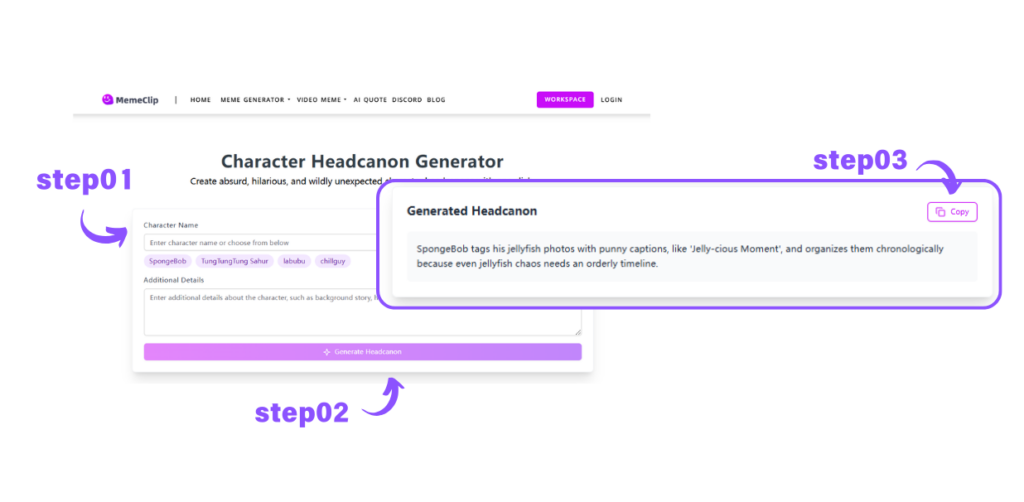
Step 1 – Define the Basics
Begin with questions: What’s their name, goals, fears? What are key traits? Traditional methods ask: Are they calm, sarcastic, ambitious? Use backstory and flaws to anchor motivation and depth.
Step 2 – Use the Generator for Inspiration
On MemeClip’s Character Headcanon Generator, input your character and select tone/length. It outputs quirky backstory snippets, hidden habits, surprising motivations.
Step 3 – Share or Re‑generate as Needed
Use MemeClip to generate multiple versions until you find one that resonates. You can copy the result to use directly in your writing or use it as a creative spark to continue developing your character’s personality.
Conclusion
You don’t need to write a full psychological profile before you start telling your story. But you do need to care about your characters enough to ask: What makes them tick?
Learning how to create a personality for a character is an ongoing skill—one you’ll refine as your story unfolds. But the more time you spend thinking about their motives, contradictions, and fears, the more alive they’ll feel to your audience.
And if you ever get stuck or need a creative spark, tools like MemeClip’s character headcanon generator are there to push your character into new, unexpected directions.
Because sometimes, the best characters are the ones who surprise even their creators.
